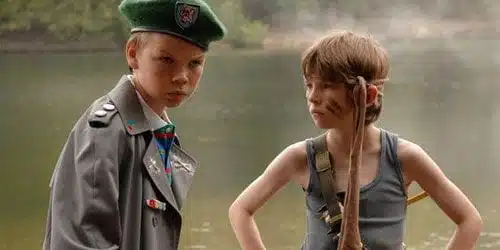
John Rambo (Sylvester Stallone) is pinning Brian Dennehey against a tree in the glorious woods of the Pacific Northwest. He cautions the sheriff not to fight him. “I could have killed them all. I could have killed you. In town, you’re the law. Out here, it’s me. Don’t push it. Don’t push it or I’ll give you a war you won’t believe,” the former Green Beret mumbles. “Let it go. Let it go.” It’s a turning point in First Blood, the movie that made Rambo an emblem of honorable rage and moral integrity.
The scene is also on a movie screen in an early scene in Son of Rambow. Smoking a cigarette as he watches, young Lee (Will Poulter) is pirating the film on his video camera. It’s 1982 or ’83, and Lee’s a renowned troublemaker in small town England, his mother away in Spain with a new boyfriend and his older brother Lawrence (Ed Westwick) either running about with his friends or issuing orders to Lee. Frustrated and intimidating, wronged and righteous, Lee has great ambitions: he’s submitting a film to a BBC contest, imagining it’s his ticket out of town.
To this end, Lee enlists a classmate, Will Proudfoot (Bill Milner). Obedient but also imaginative, Will is, along with his mother Mary (Jessica Stevenson) and little sister Jess (Tallulah Evans), a member of the ascetic Plymouth Brethren. As Mary is being courted by the domineering Brother Joshua (Neil Dudgeon), Will seeks his own respite. When the boys meet in a school hallway — Will outside his classroom while his peers view an instructional video he’s not allowed to see according to his religion, Lee outside as punishment for yet another infraction — they’re something of a too-cute odd couple. But then their friendship is forged over movies: as he’s never seen one himself, Will is thrilled to discover Lee’s illegal stash and to serve as stuntman on the short they call “Son of Rambow.” Sneaking away for brief hours after school, Will is transformed into a skinny-chested, war-painted action hero, as Lee directs a series of escape, combat, and reconciliation scenes. “It’s gonna be skill,” Lee says more than once, sure of himself and moved by his new friend.
One such scene has Will rescuing the now-aged “Rambow” from an old folks home. Here the boys employ a resident of the facility next door to the mansion where Lee and Lawrence live, sneaking into the old man’s room and dressing him up in headband and long-haired wig. For the fatherless filmmakers, this scene is surely resonant; it also illustrates Son of Rambow‘s competing inclinations toward subtle insight and sentimental ham-handedness. Initially, the boys respond quite differently to their abandonments: while Will hangs onto his dead father’s watch, Lee reports that his dad “pissed off before I was born,” drawing the lesson that “You’re pretty much better off” without parents. They find in one another a new kind of family: following an especially rewarding day of taping, Will confides earnestly, “This has been the best day of all time.”
As the boys find themselves in their project, their classmates are distracted by a group of French student visitors, especially the flamboyantly too-cool-for-school Didier (Jules Sitruk). His black hair puffed and streaked white, his jeans tight and his cigarettes exotic, Didier embodies another angle on 1980s pop culture. If Rambo represents the besieged and resilient all-American macho hero, Didier is the ambiguously gendered, wholly seductive and exciting foreigner, captivating the British schoolkids’ imaginations. A crew of boys begins to follow him through the hallways, their hair similarly streaked, their affects similarly (if awkwardly) diffident. And yet, when Didier learns of the filmmaking project he is himself smitten, immediately asking for the chance to participate.
Of course, Didier is used to being the star, which leads to some tensions and negotiations between Will (who sees the inclusion of Didier and his many fans as a positive expansion) and Lee (who wants to maintain the small, close-friends-only dimensions). As “Son of Rambo” becomes grander and more chaotic, their friendship is strained and Son of Rambow notes the Hollywoodification of the planet. To its credit, the film makes clear the irony of this situation, that First Blood was in fact a small, independent production, a declaration of emotional vulnerability and frank outrage that turned into a thick-necked patriotic franchise.
In this context, the most surprising aspect of Son of Rambow has less to do with the increasingly overwrought trajectory of the boys’ friendship than with the (admittedly brief) role played by Will’s mother. Initially, Mary appears yet another sheltered woman who must learn to open her heart to the energetic enthusiasms of childhood and also, a pop culture that has until now remained closed off to her. But even as she is immersed in a male-dominated community, she treats her young children as people, which makes her mothering a refreshing change from the models so frequently offered in mainstream movies about kids or especially, aimed at kids. Thoughtful, generous, and independent-minded when faced with edicts by the bossy and sanctimonious Brother John, Mary is, much more than Rambo, a worthy inspiration for her son.

